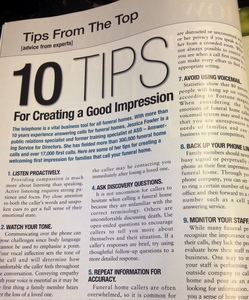10 Tips for Creating a Good Impression Over the Phone
Article originally published in American Funeral Director Magazine.
Written by: Jessica Fowler, ASD – Answering Service for Directors
The telephone is a vital business tool for all funeral homes. With more than 10 years experience answering calls for funeral homes, Jessica Fowler is a public relations specialist and former training specialist at ASD – Answering Service for Directors. She has fielded more than 300,000 funeral home calls and over 17,000 First Calls.
Below are some of her tips for creating a welcoming first impression for families that call your funeral home.
1. Listen Actively
Providing compassion is much more about listening than speaking. Active listening requires strong patience and focus. For some families, meeting face to face is not possible and arrangements must be made over the phone. Pay close attention to both the caller’s words and unspoken cues such as a long pause or sudden intake of breath to get a full sense of their emotional state.
2. Watch Your Tone
Communicating over the phone can pose challenges since body language cannot be used to emphasize a point. Your vocal inflection sets the tone of the call and will determine how comfortable the caller feels throughout the conversation. Conveying empathy and emotion with your voice is essential as it may be the very first thing a family member hears after the loss of a loved one.
3. Establish Trust
In today’s culture of automation, providing your name to callers helps humanize the conversation. This will establish trust early in the call and also prompt him or her to share their name with you which you can reference throughout the conversation. Avoid using the greeting, ‘good morning’ or ‘good evening’ as the caller may be contacting immediately after losing a loved one.
4. Ask Discovery Questions
It is not uncommon for callers to hesitate or hold back information when calling a funeral home as many are unfamiliar with the correct terminology. Others are simply uncomfortable discussing death. Use open-ended questions to encourage callers to tell you more about themselves and their situation. If a caller’s responses are brief, try using thoughtful follow-up questions to demonstrate your interest and to elicit a more detailed response.
5. Repeat Information For Accuracy
Funeral home callers are often overwhelmed, so it is common for them to relay incorrect or incomplete details over the phone. Take thorough notes and always repeat important specifics back to callers such as phone numbers, birth dates and social security numbers. This lets families know you are listening and ensures that all of your data is accurate.
6. Eliminate Distractions
When speaking to a family about a sensitive matter, consider your location carefully. A caller is likely to feel you are distracted or unconcerned with their privacy if you speak to them from a crowded room. While it’s not always possible to control where you are when a call first comes in, you can make every effort to find a more appropriate setting. Family members are more likely to understand if you ask them to wait a moment while you find a quiet place than they will be if they feel they are competing for your attention.
7. Avoid Using Voicemail
Statistics show that 80 percent of people will hang up on voicemail, according to Fortune Magazine. When considering the fragile emotions of funeral home callers, a voicemail system may send a message that you are unresponsive to the needs of families and can drive business to your competitors.
8. Back Up Your Phone Lines
Family members should never hear a busy signal or perpetually ringing phone as their first impression of your funeral home. Through your local phone company, you can set your line to ring a certain number of times in the office and then forward to a secondary number such as a cell phone or answering service. Known as “No Answer Call Forwarding”, this option ensures your firm never misses an urgent phone call.
9. Monitor Your Staff
While many funeral professionals recognize the importance of protecting their calls, they lack the proper tools to evaluate how their staff represents the business. One way to monitor how your staff is performing is to hire an outside company to call the funeral home and pose as an at-need caller looking for information. This will give you a sense of how your employees are handling these important calls while you’re away.
10. Record Calls
Using a phone system that allows you to record your calls is a helpful tool for evaluating your funeral home’s communication. Listening to recorded telephone conversations with your staff will help you to identify any bad habits and change your approach if necessary.
Further Reading: Never Miss A Call: A 10-Step Process to Bulletproofing Your Funeral Home’s Phone Lines (The Director, Feb 2013)




